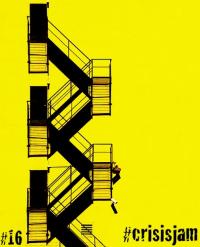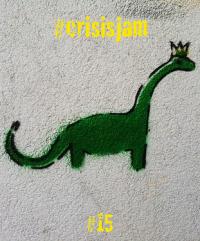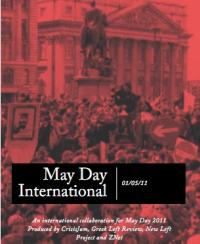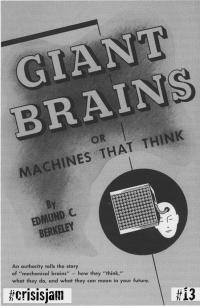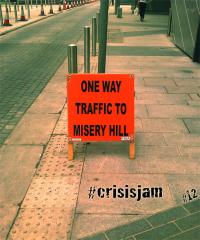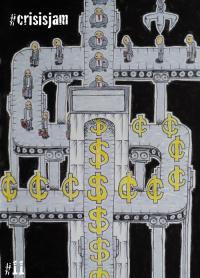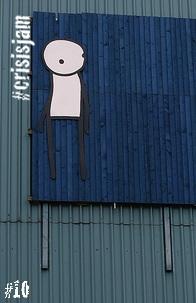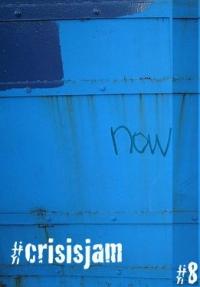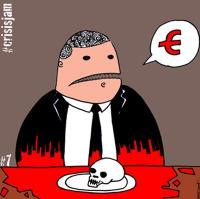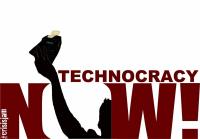In this very special, pewter coated, ermine lined commemorative edition, Gavan Titley reflects, maturely, on symbolism, politics, and domopolitics; Hugh Green looks at symbolic gestures and symbolic symbolism; Dublin Dilettante considers Ireland's New Emergency; Cian O'Callaghan looks at the Queen in the postcolony; and Adam Larragy finds parallels between Ireland in 2011 and Ireland in 1911.
|
Aidan Regan takes on the 'wages and competitiveness' argument and finds it wanting; Andy Storey reports from a global gathering in Athens to discuss debt and austerity and alternative routes out of crisis; Mark Cullinane takes on the limiting and limited parameters of We the Citizens and Eddie Brennan argues that trying to build a new society within the institutions, language and politics of the nineteenth century is hopeless, saying that what is needed from intellectuals and academics is rebellious thought.
|
In this issue of CrisisJam Alison Spillane writes that May has been a good month for government and corporate intrustiveness; John Clarke urges the Irish government to look to lenders beyond the ECB; Niall Crowley describes the 'difficult and often chaotic' process of building social and poltiical movements; Nyder O'Leary meditates on what it takes to be a 'serious man' (and why, indeed, it is almost always men who are 'serious') and Hugh Green points out that in all the pontificating about the 'bloated public sector' what's seldom acknowledged is that an attack on that sector is, in the main, an attack on the women who make up the majority of its staff.
|
This project - a collaboration between CrisisJam, the New Left Project, the Greek Left Review, Irish Left Review and ZNet - aims to facilitate greater European and international understanding of the crisis amongst those resisting neoliberal austerity measures. For more on our collective analysis see the joint statement. The material gathered aims to communicate to international audiences the nature of the way the crisis is being managed and resisted in different countries. Contributions to the CrisisJam arm of the May Day International project from Hugh Green, Andy Storey, Sinéad Kennedy, Dan Finn, Mary Murphy, Laurence Cox and Alison Spillane can be read in this issue; to see the full collection see here or download the ebook here.
|
This edition of CrisisJam looks into the potential of new media forms to increase information access and reframe public debate. Harry Browne wonders if Wikileaks's collaborations with mainstream media has done more harm than good; Steven Fake puts new media in historical context, arguing that conservative media ownership is crucial for the control of public consciousness; Dara McHugh talks to the people behind IrishLeaks; and Angela Nagle warns us not to feed the trolls...
|
Edited by Angela Nagle, this issue tells the Government to keep its hands off our social workers; while Andy Storey writes that Ireland could learn much from the Global South when it comes to dealing with its 'bailout'. Owen Hatherley walks us through the confused but telling structures of one patch of Dublin's post-industrial regeneration and Éimhín Ní Cionnaith takes on the 'careerist and conservative' student unions.
|
The current crisis will be (and is being) used to make people work harder, faster, longer. In this special edition on work, Eadaoin O'Sullivan makes an appeal for worker solidarity; Harry Browne reminds us that 'the historic ambition of the labour movement was not simply for better-paid work, or even safer or less alienating work: it was for less work; Conor McCabe writes that 'Class is not about choices or purchases or consumption or decking. It is about power'; Nyder O'Leary wonders if those who exhort that Ireland must get working know exactly what it is we're supposed to work at; and Helen Lowry debunks the myth that wages are crippling the food service industry.
|
Colin Coulter wonders why our oligarchic overlords are offering a Blueprint for National Recovery when most of them aren't tax resident; Jason Walsh reminds us that the world's eyes aren't in fact, on us; Kimmo Kallo debunks the myth that Finland is a good girl on a mission and Nyder O'Leary takes on the rural-urban divide and the Healy-Raes.
|
As March 8th marked the centenary of International Women's Day, CrisisJam takes the opportunity to focus on issues affecting women both at home and abroad. In a bumper issue,Therese Caherty puts forward the case for feminism, while Justin Frewen sheds light on the rarely reported realities of violence against women. Mary Murphy explains the necessity of gender quotas and Denise Charlton looks abroad for solutions to prostitution and sex trafficking at home. The disproportionate effects of austerity economics are highlighted by Adam Larragy, and Amel Yacef questions the future of women's rights in Egypt and Algeria. Aoife Smith draws attention to some of the world's most invisible workers and Angela Nagle sounds the alarm on the forced return of women to the home.
|
Since the foundation of the state, no matter how corrupt or incompetent, Fianna Fáil's ability to command loyalty, to bounce back and even to engender in the electorate a strange kind of sly regard for their own brown envelope crookedness seemed permanent. Last week's election has been called everything from a democratic revolution to a mandate for austerity. Whether you're inclined to view elections as a democratic right or a hollow spectacle, there is no denying that at least on the level of the zeitgeist, the obliteration of Fianna Fáil and the rise of the right and the left is pretty significant. This week's CrisisJam provides some analysis of the week that was.
- Beyond counting bad apples - Dara McHugh
- Toward a left majority? - Harry Browne
- 'The Plan is the Plan' - Dan Finn
- Time to reject 'careful now' economics - Andy Storey
- The Irish left comes of age - Sinead Kennedy
- The last of the Dublin rogues? - Donal Fallon
- Where next? A British perspective - Omayr Rehmaan Ghani
|
In the political debates of the last few weeks it has been genuinely remarkable how little has been said about those vulnerable groups within Irish society who have borne most of the impact of a crisis visited upon us by the greed and negligence of the political and corporate elite. In this week's CrisisJam, we will try and bring the focus back to the principal victims of the recession – the unemployed, poorly paid and migrant workers, young working class people imprisoned for the most innocuous offences, those condemned to misery by the cutbacks in healthcare. While things may be bad now, they might be about to get a whole lot worse.
- Welcome to the desert of the realists - Colin Coulter
- That good old public sector succubus - Alison Spillane
- The unaffordable housing scheme - Tadhg O'Sullivan
- Crime and crisis in three easy election clichés - Liam Herrick
- Ireland's falling life expectancy - Sara Burke
- Low paid workers and the meaning of 'exploitation' - Fran P. Bowman
- Are workers' rights a sideline to economic survival - Christina Finn
- Casualties of the Crisis - Alison Spillane
(Image left: Killian Redmond)
|
Election 2011 is the most important political event in the history of the state. It provides the people of Ireland with the chance to play Bill Cullen and hire the best, those with the liathróidí, nimbleness and expertise to find different ways of telling us there is no alternative. In light of this, CrisisJam presents a bumper edition curated by Gavan Titley. The will of the people, adjusted for reality, approved by experts. It's time for Technocracy Now!
- The boys are back in town...for 182 days of the year at least – Mary Gilmartin
- Shut the revolving door on the way out: the politics of negative internationalisation – Hugh Green
- Ireland first! Gibraltar a close second! – Patrick Barry
- Fast forward to the Counter-Reformation – Jason Walsh
- From the 'Soul of Haiti' to 'the Pluck of the Irish': Neoliberalism and the Discourse of Resilience – Audrey Bryan
- Campaign rhetoric and the geographies of the economic crisis – Patricia Wood
- What is neoliberalism and why does it matter - Aidan Regan
- Too stupid to vote? - Angela Nagle
- D is for Deliberate: the IMF and the uses of stupidity - Andy Storey
- Band of brothers - Nyder O'Leary
- Who is homo economicus? - Aidan Regan
- Our moral duty to lie to pollsters - Joe Galvin
- Fine Gael: the videogame - Illan Rua Wall
- Selling off the soul of science - Eadaoin O'Sullivan
(Image left Eadaoin O'Sullivan)
|


